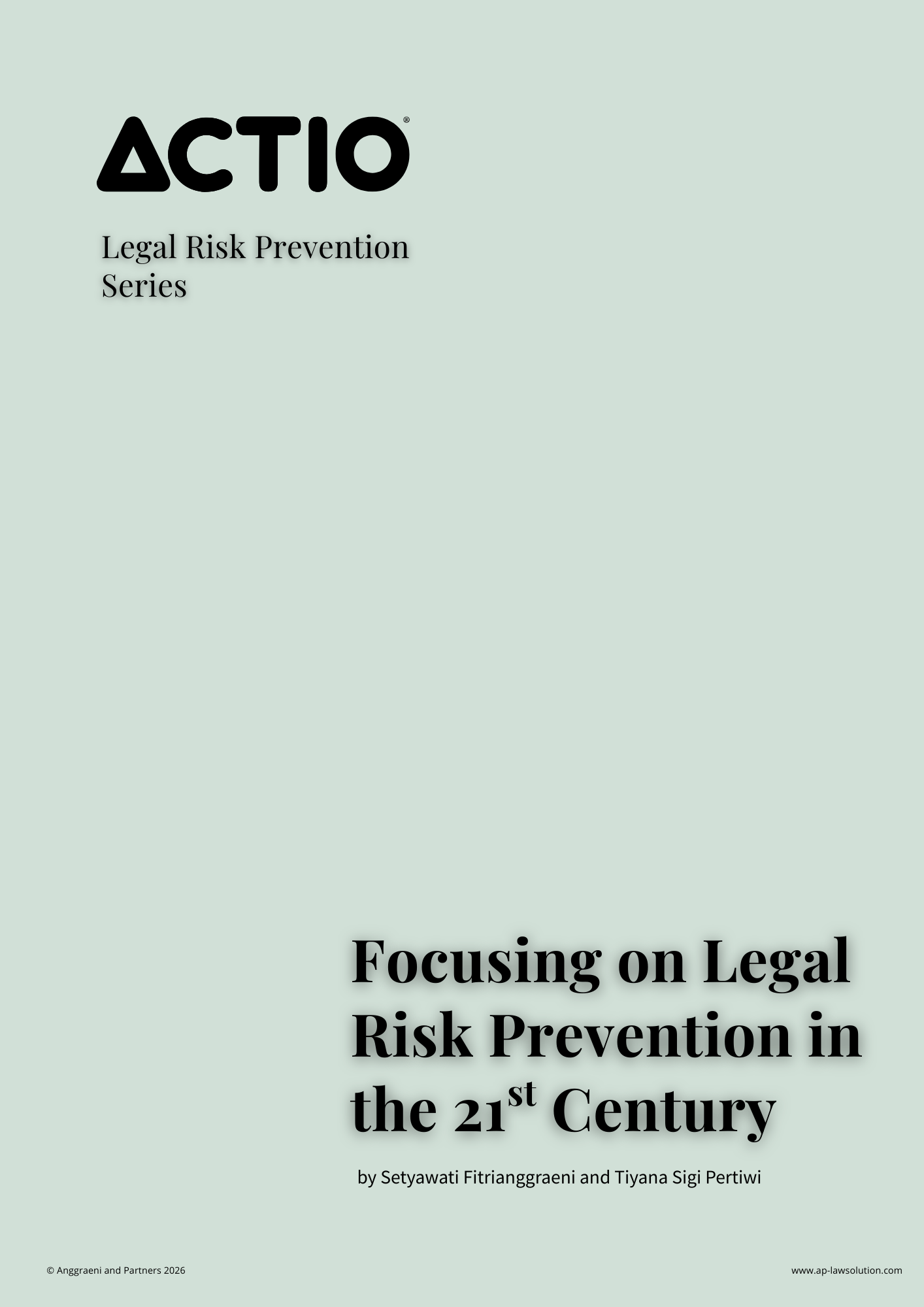By Setyawati Fitrianggraeni, Reynalda Basya Ilyas, Casey Jovenia
Why the Transition Period Matters
Indonesia’s Personal Data Protection Law (Law No. 27 of 2022, or “PDP Law”), enacted in October 2022, provided a two-year transition period that ended in October 2024. This period allowed businesses from global enterprises to small startups to adapt to its comprehensive requirements for safeguarding personal data and respecting data subject rights.
With the transition now over, enforcement is ramping up. Non-compliance risks hefty penalties, including fines up to 2% of annual revenue, operational suspensions, or even criminal charges in extreme cases. However, compliance isn’t just about dodging fines—it’s a chance to gain a competitive edge. This article outlines the benefits, challenges, and actionable steps to navigate the PDP Law effectively.
The Upside of Compliance: Beyond Regulatory Checkboxes
Adhering to the PDP Law offers tangible rewards for businesses willing to invest in privacy:
- Attracting Foreign Investment: Companies with strong data protection practices stand out to international investors. A 2023 Deloitte survey revealed that 78% of global investors consider data compliance a key factor in funding decisions. Compliance also aligns with global standards like the GDPR, facilitating cross-border collaborations.
- Enhanced User Trust: Transparent data practices can cut app bounce rates by up to 20%, as privacy-conscious users favor secure platforms.
- Operational Efficiency: Mapping data flows improves system integration, reducing onboarding times for new tools by an estimated 30%.
- Risk Mitigation: Proactive compliance lowers the odds of sanctions, reputational harm, and expensive breach recoveries.
Managing Incidents and Data Breaches: A Team Effort
A data breach demands more than an IT fix—it’s a company-wide challenge. The PDP Law requires notifying regulators and affected parties within 72 hours of detection. Delays can be costly: in 2023, an Indonesian e-commerce company took a week to report a phishing breach affecting 50,000 users, resulting in a 15% trust drop and a PR crisis.
Key elements of effective incident management include:
- Standard Operating Procedures (SOPs): Define clear escalation paths for regulators and internal teams.
- Cross-Functional Response: IT contains the breach, Legal ensures compliance, HR addresses staff errors, and PR manages messaging.
- Documentation: Log incidents thoroughly for reporting and future safeguards.
Three Common Challenges and How to Tackle Them
Compliance isn’t without hurdles. Here’s how to address them:
| Challenge |
Impact |
Solutions |
| Missing legal documents (e.g., ROPA, DPIA) |
Slow responses, higher sanction risks |
Use templates; align Legal and IT for quick drafting |
| Delayed incident response |
Trust loss, penalties, rising costs |
Create 72-hour SOPs with defined workflows and escalation steps |
| Low data protection awareness |
Human errors like leaks or phishing |
Offer regular training, quizzes, and breach simulations |
Case Study: A clinic cut human error incidents by 40% in six months after introducing quarterly phishing drills.
Five Practical Steps to Strengthen Compliance
Start today with these actionable steps:
- Conduct a Quick Audit
Identify sensitive data (e.g., IDs, health records) and assess storage and access controls against PDP Law standards. Tip: Use a checklist for completeness.
- Appoint a Temporary Data Protection Officer (DPO)
While not always required, a DPO can streamline compliance efforts. A Jakarta fintech saw a 40% risk reduction after assigning one during the transition.
- Draft a 72-Hour Notification Template
Prepare customizable notices for regulators and users, ensuring rapid, compliant communication during incidents.
- Perform a Concise DPIA
For high-risk operations (e.g., financial data processing), a Data Protection Impact Assessment pinpoints risks and solutions like encryption.
- Run Incident Simulations
Test your response with mock breaches, involving IT, Legal, PR, and leadership. Regular drills can cut response times in half.
Quick Wins for SMEs and Startups
Limited budget? These steps deliver big results fast:
- Simplified Consent Forms: Clear, concise forms boost trust—a local retailer saw 25% more sign-ups after streamlining theirs.
- Two-Factor Authentication (2FA): Adding 2FA to dashboards cuts unauthorized access risks by 70%.
- Automated Logs: Plugins for data tracking save 20 hours monthly and ensure audit-readiness.
Expert Insights: Voices from the Field
- “Build privacy into your systems from the start—waiting for full regulations is a missed opportunity.” — Rindy, CEH
- “A breach affects more than IT. Without HR, Legal, and PR alignment, reputational costs skyrocket.” — Syahraki Syahrir, CISA
- “Compliance is a mindset, not a one-off task. Start small and scale up.” — Imelda, Data Privacy Consultant
Closing Thoughts: Privacy as a Way of Life
The PDP Law’s transition period is history, but compliance is an ongoing commitment. Audits, training, and simulations lay the groundwork for resilience and trust. In a data-centric world, privacy isn’t just a rule—it’s a business advantage. Take action now and make data protection your strength.
Sources and References
-
Law No. 27 of 2022 on Personal Data Protection
-
Privasimu, Marsh, ELSAM: Regulatory updates and risk insights
-
Kominfo, Liputan6, Kompas: PDP Law enforcement and mitigation trends
-
DISCLAIMER:
This disclaimer applies to the publication of articles by Anggraeni and Partners. By accessing or reading any articles published by Anggraeni and Partners, you acknowledge and agree to the terms of this disclaimer:
No Legal Advice: The articles published by Anggraeni and Partners are for informational purposes only and do not constitute legal advice. The information provided in the articles is not intended to create an attorney-client relationship between Anggraeni and Partners and the reader. The articles should not be relied upon as a substitute for seeking professional legal advice. For specific legal advice tailored to your individual circumstances, please consult a qualified attorney.
Accuracy and Completeness: Anggraeni and Partners strive to ensure the accuracy and completeness of the information presented in the articles. However, we do not warrant or guarantee the accuracy, currency, or completeness of the information. Laws and legal interpretations may vary, and the information in the articles may not be applicable to your jurisdiction or specific situation. Therefore, Anggraeni and Partners disclaim any liability for any errors or omissions in the articles.
No Endorsement: Any references or mentions of third-party organizations, products, services, or websites in the articles are for informational purposes only and do not constitute an endorsement or recommendation by Anggraeni and Partners. We do not assume responsibility for the accuracy, quality, or reliability of any third-party information or services mentioned in the articles.
No Liability: Anggraeni and Partners, its partners, attorneys, employees, or affiliates shall not be liable for any direct, indirect, incidental, consequential, or special damages arising out of or in connection with the use of the articles or reliance on any information contained therein. This includes but is not limited to, loss of data, loss of profits, or damages resulting from the use or inability to use the articles.
No Attorney-Client Relationship: Reading or accessing the articles does not establish an attorney-client relationship between Anggraeni and Partners and the reader. The information provided in the articles is general in nature and may not be applicable to your specific legal situation. Any communication with Anggraeni and Partners through the articles or any contact form on the website does not create an attorney-client relationship or establish confidentiality.
By accessing or reading the articles, you acknowledge that you have read, understood, and agreed to this disclaimer. If you do not agree with any part of this disclaimer, please refrain from accessing or reading the articles published by Anggraeni and Partners.
For further information, please contact:
 WWW.AP-LAWSOLUTION.COM
WWW.AP-LAWSOLUTION.COM
P: 6221. 7278 7678, 72795001
H: +62 811 8800 427
Anggraeni and Partners, an Indonesian law practice with a worldwide vision, provides comprehensive legal solutions using forward-thinking strategies. We help clients manage legal risk and resolve disputes on admiralty and maritime law, complicated energy and commercial issues, arbitration and litigation, tortious claims handling, and cyber tech law
S.F. Anggraeni
Managing Partner
fitri@ap-lawsolution.net
Reynalda Basya Ilyas
Managing Associate
reynalda.bi@ap-lawsolution.net
Cassey Jovenia
Junior Associate
cassey.jv@ap-lawsolution.net


